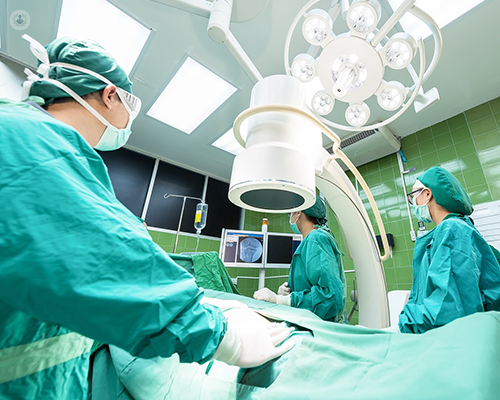The advantages of robotic surgery for patient outcomes
Written in association with:Robotic surgery, also known as robot-assisted surgery, is transforming the landscape of modern medicine, enabling surgeons to perform complex and delicate procedures with unparalleled precision and control. Particularly advantageous for conditions like colorectal diseases, robotic surgery stands at the forefront of surgical innovation.
Mr Danilo Miskovic, one of the UK’s leading robotic colorectal surgeons, explains the essential aspects of robotic surgery, providing patients with the information needed to understand this advanced surgical approach.

What is robotic surgery?
Robotic surgery is a form of minimally invasive surgery in which a surgeon utilises robotic systems to carry out procedures. These robotic systems typically feature a camera arm and mechanical arms fitted with surgical instruments, enabling precise and controlled movements.
Robotic surgery is especially advantageous for treating colorectal conditions and performing related procedures. These include:
- Colorectal cancer: Robotic surgery enhances precision, allowing for better removal of cancerous tissues while preserving healthy tissues.
- Diverticulitis: Robotic surgery facilitates the resection of affected bowel segments with minimal invasiveness.
- Inflammatory bowel disease (IBD): Robotic surgery treats conditions like Crohn's disease and ulcerative colitis more effectively by reducing surgical complications.
- Rectal prolapse: Robotic surgery offers a less invasive approach to repairing rectal prolapse, leading to a faster recovery.
In addition, we also offer robotic surgery for hernias of the abdominal wall (inguinal, umbilical, incisional, rectus divarication, parastomal).
The minimally invasive nature of robotic surgery results in smaller incisions, reduced blood loss, less pain, and quicker recovery times, making it highly suitable for colorectal surgeries.
How is robotic surgery performed?
Robotic surgery involves several key steps, each meticulously designed to enhance precision and patient safety.
During a robotic surgery procedure, you will be given general anaesthesia to ensure that you remain asleep and free from pain throughout the operation. Small incisions, usually ranging from 1 to 2 centimetres, are then made to allow the insertion of the robotic instruments and camera.
After, the robotic system is positioned and docked to your body, with the instruments inserted through the incisions. The surgeon controls the robotic arms from a console, utilising a high-definition 3D camera to direct the instruments with precision, and the robotic arms translate the surgeon’s hand movements into smaller, highly precise motions.
Once the procedure is complete, the instruments are removed, and the incisions are closed with sutures or staples.
What can I expect during the recovery period after robotic surgery?
In the recovery room, the surgical team will monitor you as the anaesthesia wears off. The pain is typically less intense than with open surgery due to the smaller incisions, but if you are in any discomfort, you will be provided with pain relief medications. Vital signs and the surgical site will be closely observed to ensure that there are no immediate complications.
Robotic surgeries, especially minor ones, may even be outpatient procedures. However, you may need to stay in the hospital for a few days depending on the exact procedure. You will be encouraged to move around to promote blood circulation and prevent complications like blood clots. Initially, a light diet will be recommended, gradually returning to normal as tolerated.
It’s important to follow instructions on how to care for your incisions to prevent infection. Most patients can return to normal activities, including work and exercise, within a few weeks. However, heavy lifting and strenuous activities should be avoided until your surgeon gives the go-ahead.
How does robotic surgery impact patient outcomes?
Robotic surgery significantly impacts patient outcomes positively by offering several advantages over traditional surgical methods.
One of the primary benefits is reduced pain and discomfort; the smaller incisions used in robotic surgery lead to less postoperative pain. This minimally invasive approach also contributes to a shorter hospital stay for many patients, which in turn reduces the risk of hospital-acquired infections. Furthermore, patients often experience faster recovery times, allowing them to return to normal activities more quickly.
Another notable advantage of robotic surgery is reduced blood loss during procedures. The precise movements facilitated by robotic systems, along with the smaller incisions, contribute to less blood loss which enhances overall patient safety. Additionally, the precision of robotic surgery lowers the risk of complications such as infections and injuries to surrounding tissues. From a cosmetic perspective, smaller incisions also result in less scarring, which can be a significant consideration for many patients.
Moreover, robotic systems provide surgeons with unmatched precision, which is particularly beneficial in complex procedures. This level of precision promotes more successful outcomes and helps preserve as much healthy tissue as possible. Consequently, patients report higher satisfaction levels due to the reduced pain, quicker recovery times, and better outcomes associated with robotic surgery.
The field of robotic surgery is continually evolving, with advancements aimed at further improving surgical outcomes and expanding the types of procedures that can be performed robotically. Innovations such as smaller and more versatile robotic systems are likely to make this technology accessible for a broader range of surgical specialities.
If you would like to schedule an appointment with Mr Danilo Miskovic, head on over to his Top Doctors profile today.


